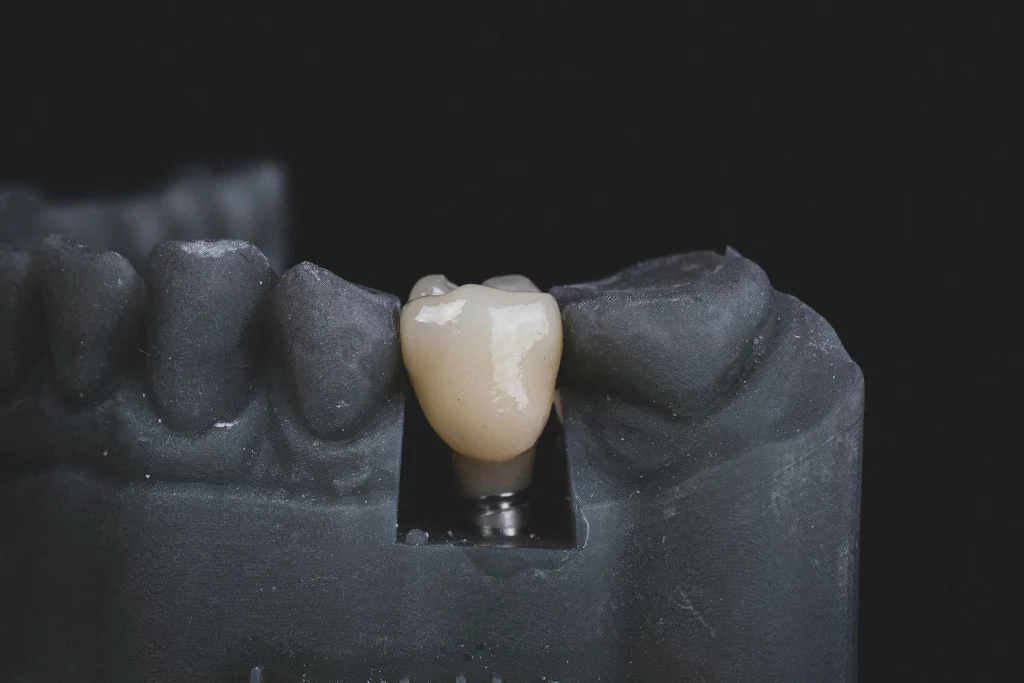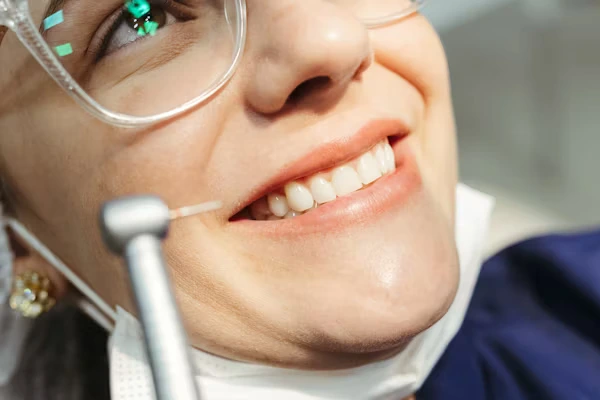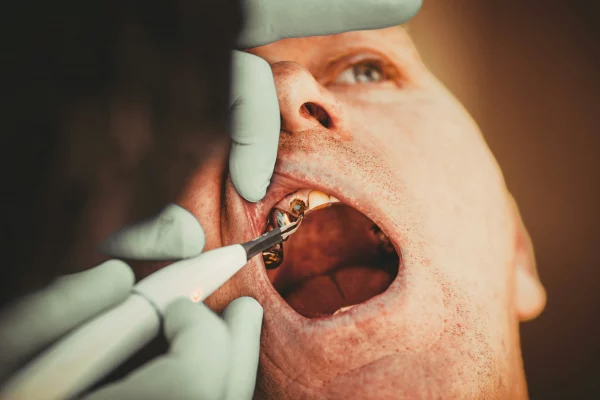Dental implants have undeniably revolutionized restorative dentistry, offering patients an advanced alternative to traditional tooth replacement. That said, dentures continue to serve as a practical and widely accessible solution for many individuals. Deciding between these two options is not always straightforward, as each presents distinct advantages, limitations, and suitability depending on the patient’s specific needs.
Whether addressing the absence of a single tooth or seeking full-mouth rehabilitation, a comprehensive understanding of the differential attributes of implants and dentures such as their functional performance, aesthetic outcomes, durability, and financial implications is essential. A comparison of these factors can empower patients to make well-informed decisions tailored to their oral health goals.
Dental Implants vs Dentures: Key Differences

Both dental implants and dentures serve the purpose of replacing missing teeth, yet their mechanisms differ rather significantly.
Dental implants involve the surgical placement of titanium posts into the jawbone. These posts integrate with the bone, essentially functioning as artificial roots to support crowns, bridges, or even dentures. This approach provides a stable and long-lasting solution, closely mimicking the function and appearance of natural teeth. In contrast, dentures are removable prosthetic devices composed of materials such as acrylic, resin, or metal. They rest on the gums and are held in place by suction, adhesives, or metal clasps. While they do not require surgical intervention, their stability and comfort can vary depending on fit and method of retention.
The method of attachment for each option significantly impacts their comfort, aesthetics, and functional performance.
Functionality and Comfort Comparison
Dental implants represent a significant advancement in restorative dentistry. By integrating directly with the jawbone, they closely replicate the function and sensation of natural teeth during activities such as chewing and speaking. This integration allows patients to consume foods like apples or steak without concern for instability.
Traditional dentures, conversely, often present challenges related to bulkiness and inadequate retention. Lower dentures, in particular, are prone to shifting during mastication or speech. While upper dentures typically achieve greater stability through suction, the requisite palate coverage can diminish both taste and oral comfort.
For individuals prioritizing comfort and confidence during meals, dental implants frequently provide superior outcomes compared to conventional dentures.
Aesthetic Results: Which Looks More Natural?

Aesthetic considerations extend beyond a person’s smile—they significantly influence facial appearance, even when the face is at rest.
Dental implants play an important role in maintaining facial structure by preserving the underlying bone. This helps prevent the development of sunken cheeks and premature facial aging. Additionally, each implant crown is carefully designed to match the natural shade and shape of the patient’s existing teeth, ensuring a seamless appearance. Modern dentures can also achieve a pleasing look. Nonetheless, it is important to acknowledge that long-term use of dentures, without the bone stimulation that implants provide, may result in gradual jawbone loss. This loss can alter facial contours over time, potentially impacting overall appearance.
Long-Term Oral Health Impact
One of the most notable benefits of dental implants lies in their role in maintaining long-term oral health.
Dental implants integrate directly with the jawbone, a process known as osseointegration, which helps preserve bone density following tooth loss. This ongoing stimulation is vital; without it, the jawbone can begin to deteriorate over time.
In contrast, traditional dentures rest atop the gums and do not provide any stimulation to the underlying bone. As a result, patients with dentures often experience progressive bone resorption, which can eventually cause dentures to fit poorly and require frequent adjustments or replacements.
For individuals seeking to maintain a strong and healthy jaw, dental implants offer a proactive and effective solution.
Cost of Dental Implants and Dentures Explained
Affordability remains a significant factor when selecting appropriate dental care. Patients should be aware of the various expenses involved, beginning with the initial consultation and continuing through subsequent treatments and maintenance. A detailed understanding of these financial aspects enables individuals to make well-informed decisions that balance both health priorities and budgetary limitations.
Average Cost of a Single Implant vs Full Denture
A single dental implant typically costs between $3,000 and $5,000, which covers the implant itself, the abutment, and the crown. For those considering full dentures either upper or lower the price generally ranges from $1,000 to $3,000. Premium dentures, which provide enhanced aesthetics and improved fit, may exceed $5,000 per arch.
Although dental implants involve a higher initial investment, they often demand fewer replacements and adjustments over time compared to traditional dentures.
Insurance Coverage and Financing Options
Dental insurance coverage is, frankly, all over the place. Typically, standard policies will cover dentures to some extent—nothing too shocking there. When it comes to dental implants, though, that’s where things get prickly. A lot of insurers still label implants as “elective,” which, honestly, feels a bit outdated. Thankfully, some providers are starting to acknowledge the practical, long-term benefits of implants.
As for the financial side, dental clinics aren’t oblivious to the high costs. Many now offer payment plans, third-party financing options, or recommend using Health Savings Accounts (HSAs) to offset expenses. So, while insurance might not cover everything, there are still several avenues to make implants at least somewhat attainable.
Cost of Full Mouth Dental Implants
All-on-4 or All-on-6 implant-supported dentures, these refer to fixed dental prosthetics anchored by four to six implants per dental arch, generally range in cost from $15,000 to $30,000 per arch. While the initial investment is significant, these prostheses closely mimic the appearance and function of natural teeth. Furthermore, they tend to reduce or even eliminate the need for ongoing denture adjustments or the use of adhesives, offering patients a more permanent and convenient restorative solution.
Who Is a Good Candidate for Each Option?
Ultimately, the most suitable treatment hinges on your unique health status, daily habits, and personal priorities. It’s not just about clinical effectiveness—your comfort and long-term objectives matter, too. In the end, aligning medical decisions with your individual lifestyle ensures both practicality and sustainability.
When to Choose Dental Implants
Candidates for dental implants typically exhibit several key characteristics: they present with one or more missing teeth, maintain healthy gums, and possess an adequate amount of jawbone to support the implant. Non-smokers, or those willing to cease smoking, are generally preferred due to improved healing outcomes. Implants are often favored for their fixed nature and natural feel compared to removable alternatives.
While prompt placement following tooth loss is ideal, individuals who have experienced significant time since tooth extraction may still be eligible. In such cases, bone grafting or sinus lift procedures can be employed to restore sufficient bone structure, thereby expanding the pool of suitable candidates.
When Dentures Might Be a Better Fit
Dentures tend to be the preferred option for individuals requiring a complete set of replacement teeth and wishing to avoid surgical procedures. Additionally, for those managing health conditions such as poorly controlled diabetes that may complicate the healing process after implant surgery, dentures present fewer risks. Cost is another significant factor; dentures are generally more affordable and offer the convenience of being removable. It’s also common for patients to begin with dentures as a practical solution and later transition to implants if their health and financial circumstances improve.
Maintenance and Lifespan Comparison
While maintaining proper oral hygiene is beneficial for both dental implants and dentures, the two differ significantly in terms of longevity and upkeep. Dental implants are generally recognized for their durability and often require less day-to-day maintenance compared to dentures. Dentures, conversely, tend to demand more meticulous care to remain functional and comfortable over time. Thus, although both benefit from consistent oral care, their long-term maintenance needs and durability vary considerably.
How Long Do Dental Implants Last?
With consistent oral hygiene and regular dental evaluations, dental implants are capable of lasting several decades—occasionally even a lifetime. The titanium post itself is remarkably durable, though the crown may require replacement after roughly ten to fifteen years due to everyday wear.
While implants are not susceptible to cavities, they aren’t immune to complications. Gum disease, for instance, can significantly impact their longevity. Therefore, maintaining diligent brushing, flossing, and attending routine dental appointments remains essential for long-term implant success.
How to Care for Dentures Properly
Proper denture maintenance is essential for both hygiene and longevity. Each night, dentures should be removed and soaked in water or a recommended cleansing solution, this helps prevent bacterial buildup and maintains their shape. Avoid using regular toothpaste, as it can be abrasive; instead, opt for a soft-bristled brush and a cleanser specifically designed for dentures. After meals, rinsing dentures under running water is advisable to eliminate food debris.
Dentures should always be stored in water when not in use, as letting them dry out may cause warping. With consistent care, most dentures will remain functional for approximately five to eight years, although natural changes in jaw structure or general wear may require earlier replacement.
Combining Implants and Dentures: A Modern Solution
Selecting between implants and dentures isn’t always a binary decision. In fact, hybrid solutions exist that integrate advantages from both approaches. Consulting with your dentist can reveal these combined options, which may better address individual needs than either method alone.
What Are Implant-Supported Dentures?
Implant-supported dentures represent a significant advancement over traditional removable dentures. By attaching securely to implants placed within the jawbone, these dentures deliver a notably more stable and reliable fit. This is especially beneficial for lower dentures, which are traditionally more prone to shifting and discomfort.
Despite their secure attachment, these dentures remain removable for routine cleaning, combining convenience with stability. The result is improved comfort and functionality for the patient, alongside better preservation of the underlying bone structure. Furthermore, this hybrid approach offers these advantages at a cost lower than that of a full set of individual implants.
Benefits of Hybrid Implant Systems
The All-on-4 and All-on-6 systems represent innovative approaches in dental implantology, allowing for the attachment of an entire dental arch using a limited number of implants. This method offers several notable advantages: it minimizes the number of implants required, thereby reducing surgical intervention and shortening healing times. The fixed, non-removable nature of these prostheses ensures both stability and convenience. Additionally, the aesthetic outcome closely mimics natural dentition. For patients seeking a permanent solution without incurring the significant expense associated with individual implants for each tooth, these hybrid systems present a practical and cost-effective alternative.
Frequently Asked Questions (FAQs)
1. Are dental implants more painful than dentures?
Dental implants require a surgical procedure, which can lead to mild swelling or discomfort for a few days. Most patients manage this easily with over-the-counter pain relievers. Once fully healed, implants feel secure, comfortable, and more natural than traditional dentures. In contrast, dentures don’t involve surgery, making them a less invasive option. However, they may cause sore spots, irritation, or slipping over time, especially if not properly fitted. Each option comes with its own recovery experience and long-term comfort level.
2. Are dental implants more painful than dentures?
Yes, many patients start with dentures and decide to transition to dental implants later on. This approach can be practical, especially when immediate implants aren’t an option. However, without the stimulation that implants provide, the jawbone can shrink over time. This bone loss may require additional procedures like bone grafting before implants can be placed. Planning ahead with a dental implant specialist allows you to preserve more options for the future. An early consultation can help you understand the timeline, risks, and best steps forward.
3. What’s the most affordable long-term option?
While dentures generally cost less upfront, dental implants often prove more cost-effective in the long run. Dentures may require regular adjustments, relining, or even full replacement every few years. These ongoing expenses can add up over time. In contrast, implants are built to last and typically need less maintenance, making them a durable and long-term investment. For those seeking a balance between cost and stability, implant-supported dentures offer an effective middle ground. They provide enhanced comfort and function without the full cost of individual implants.
4. Do implants prevent bone loss better than dentures?
Absolutely. Dental implants are the only tooth replacement option that actively stimulates the jawbone, helping to prevent bone deterioration over time. This stimulation mimics the natural pressure of chewing, which keeps the bone healthy and strong. On the other hand, dentures rest on the gums and do not provide the same benefit. Without stimulation, the jawbone can gradually shrink, leading to changes in facial structure and fit issues with dentures. This bone loss can impact both appearance and oral function. Choosing implants early can help preserve jawbone health and long-term stability.
Ready to reclaim your smile? Choosing between dental implants and dentures doesn’t have to be overwhelming. With expert guidance, you can select a solution that meets your needs, lifestyle, and budget. Whether you’re ready to book a consultation or simply want to explore your options, our dental team is here to help. We’ll walk you through every step from planning and financing to final results so you feel informed and confident in your care. Contact us now at GP Dental.
Your smile deserves a strong foundation. Let’s build it together.


